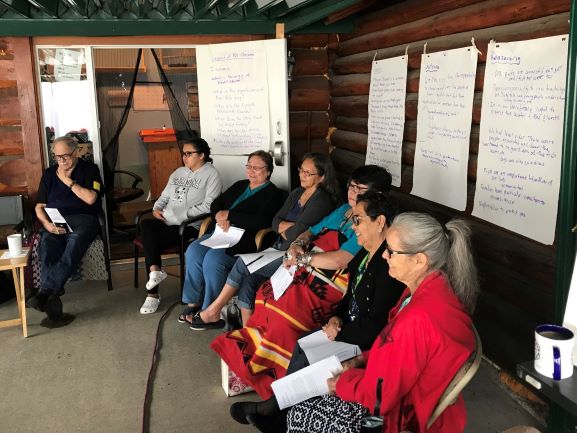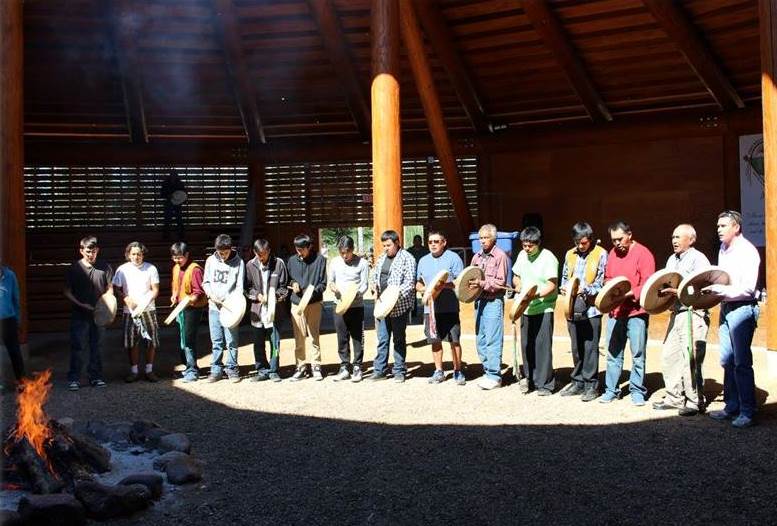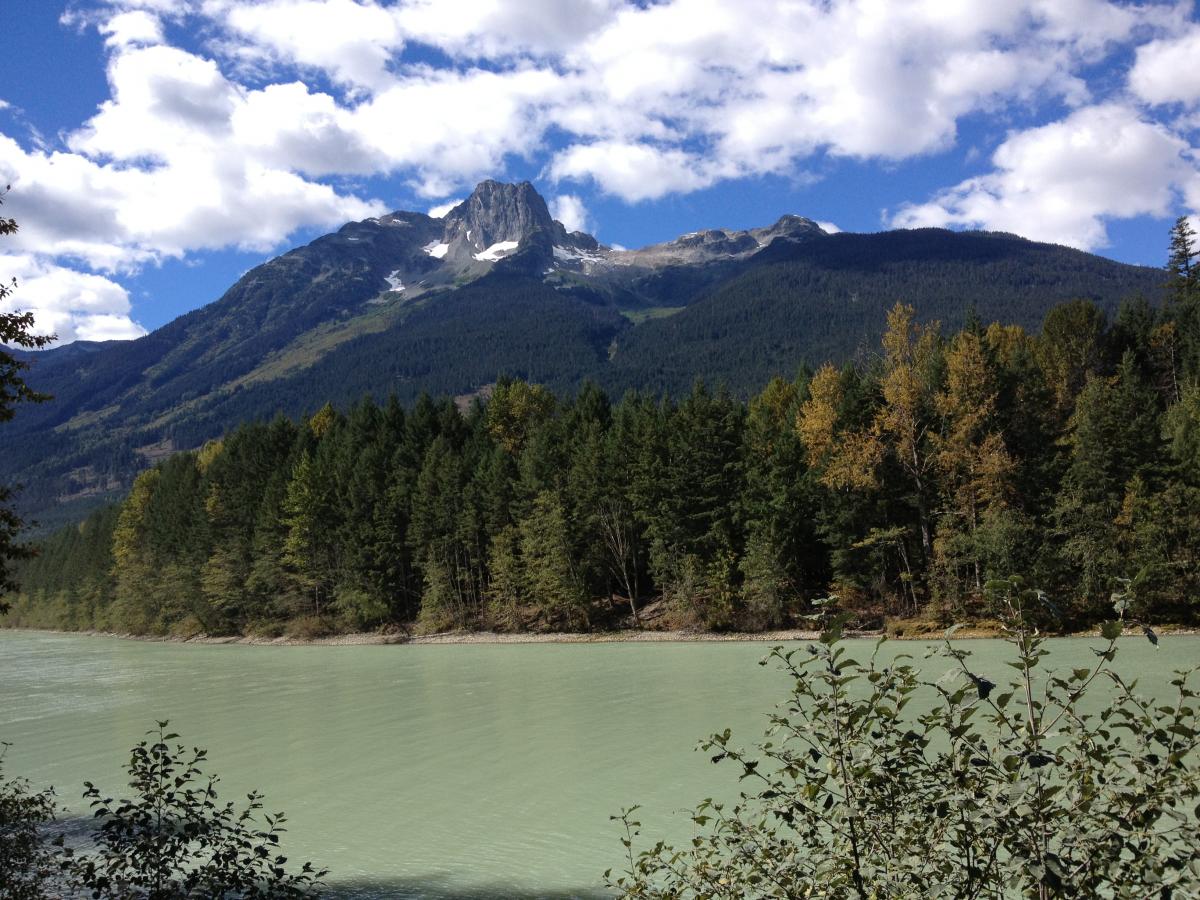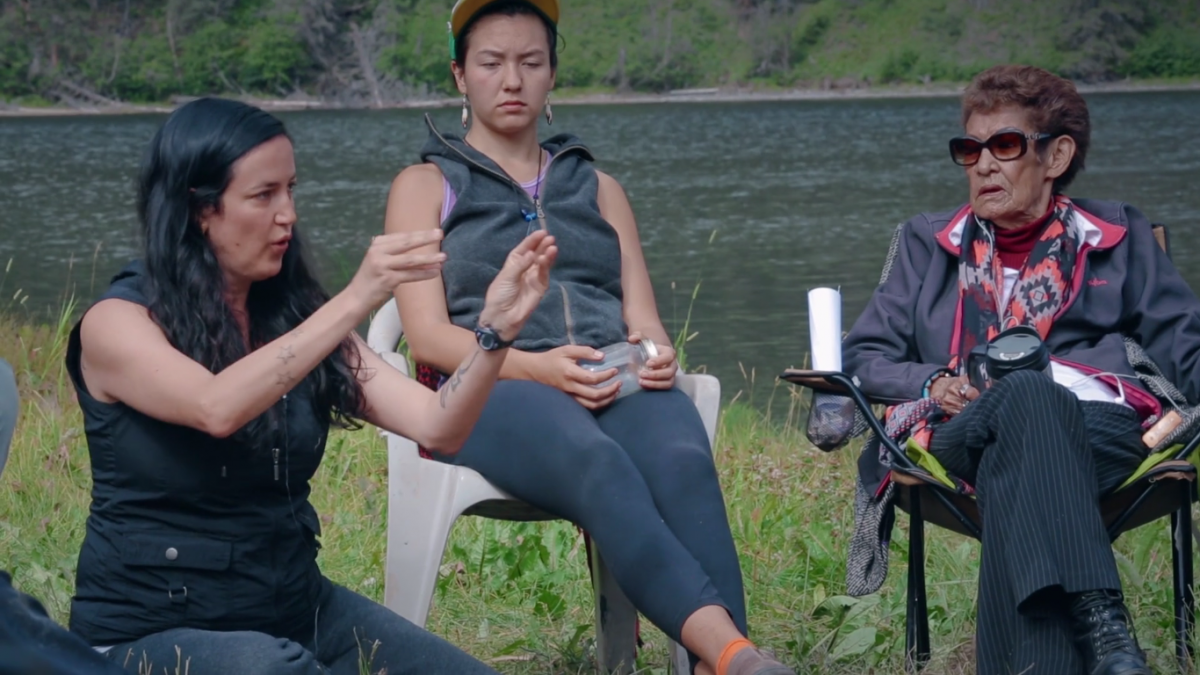
Extractive industries, climate change and development are just a few of the factors threatening water sources. Indigenous communities are uniquely affected by changes in the water, and are more likely to be on boil-water advisories. In many places people can no longer go out on the land and drink water straight from the streams. The health and abundance of fish have changed as water quality has decreased, which in turn affects Indigenous diets.
West Coast is working with Indigenous nations to articulate, revitalize and apply their traditional water laws.
Indigenous laws are deeply connected to the water. As Danika Billie Littlechild explains:
When First Nations lose access to a sacred or traditional water source, they also lose access to the beings and spirits that inhabit that water source. This loss ripples out. Stories, songs, dances, and even Indigenous words related to or based in that water source are also lost. The foundational elements of Indigenous legal traditions and knowledge systems are therefore at risk.
Our work aims to ensure the beings, stories and worlds connected to the water remain healthy.
Lower Fraser Fisheries Alliance
 The RELAW (Revitalizing Indigenous Law for Land, Air and Water) project is partnered with the Lower Fraser Fisheries Alliance (LFFA), a voice for the First Nations of the Lower Fraser River relating to their inherent rights to fisheries. During a year in which some fishing openings were measured in hours, not days the LFFA nations are looking to their own laws about watershed management and fisheries governance for direction and solutions.
The RELAW (Revitalizing Indigenous Law for Land, Air and Water) project is partnered with the Lower Fraser Fisheries Alliance (LFFA), a voice for the First Nations of the Lower Fraser River relating to their inherent rights to fisheries. During a year in which some fishing openings were measured in hours, not days the LFFA nations are looking to their own laws about watershed management and fisheries governance for direction and solutions.
This past year, the LFFA-RELAW team of Leah Ballantyne (LFFA coordinator), Rayanna Seymour-Hourie and Jessica Clogg (from West Coast) focussed on reading, sharing and discussing the sxwōxwiyám (stories/oral histories from the distant past), with dialogue among Elders, Knowledge Holders and LFFA members. The LFFA-RELAW team is currently completing a Legal Synthesis Report, which consolidates the year-long learning of what stories, both sxwōxwiyám and sqwélqwel (“true stories”) and Elder’s knowledge teaches us about Indigenous laws related to watershed management and fisheries governance in the Lower Fraser.
Fort Nelson First Nation
 Fort Nelson First Nation, located in the Northern Rockies – in Treaty 8 territory in the northeast corner of BC – joined the first RELAW cohort with the goal of creating a water policy using their traditional laws as a foundation. The RELAW team collected literature and held interviews with community knowledge-holders. Through this work, they realized that the RELAW Project was also an opportunity to create a living document outlining the history and the culture of their unique community that could be used in both preservation and revitalization of their Indigenous way of being. A RELAW-themed art contest, focused on the depiction of the laws of land and nature, also encouraged community members to consider their own stories and intrinsic connection to the natural world around them.
Fort Nelson First Nation, located in the Northern Rockies – in Treaty 8 territory in the northeast corner of BC – joined the first RELAW cohort with the goal of creating a water policy using their traditional laws as a foundation. The RELAW team collected literature and held interviews with community knowledge-holders. Through this work, they realized that the RELAW Project was also an opportunity to create a living document outlining the history and the culture of their unique community that could be used in both preservation and revitalization of their Indigenous way of being. A RELAW-themed art contest, focused on the depiction of the laws of land and nature, also encouraged community members to consider their own stories and intrinsic connection to the natural world around them.
St’át’imc First Nation
 The St’át’imc tell stories of a time when Transformers travelled throughout the land, changing the landscape so it would sustain life. Many of the mountains, valleys, lakes, and rivers in St’át’imc territory were created by the Transformers. Today, the Nation is concerned that water is not as safe as it once was. With pressures from mining, logging, dams, and population growth in their territory, elders have expressed fears that they can’t drink water from the streams like they used to. Water levels and quality have also affected the salmon run on the Fraser River, which the St’át’imc have relied on for generations.
The St’át’imc tell stories of a time when Transformers travelled throughout the land, changing the landscape so it would sustain life. Many of the mountains, valleys, lakes, and rivers in St’át’imc territory were created by the Transformers. Today, the Nation is concerned that water is not as safe as it once was. With pressures from mining, logging, dams, and population growth in their territory, elders have expressed fears that they can’t drink water from the streams like they used to. Water levels and quality have also affected the salmon run on the Fraser River, which the St’át’imc have relied on for generations.
The St’át’imc Chiefs Council first began its work with RELAW with a focus on water in 2016-17. You can learn more about their journey through the following publications:
Revitalizing Indigenous Law for Land, Air and Water: St’át’imc Legal Traditions Report: This 203-page report shares teachings from the stories and St’át’imc Elders about legal rights, responsibilities and standards, legal processes and decision-making, teaching, consequences and enforcement, as well as foundational legal principles and legal principles related to inter-community and international relations.
St’át’imc Legal Traditions Summary Report: What We Learned from the Stories and our Elders: This 44-page booklet uses images from the territory and quotes from knowledge holders to illustrate a summary of St’át’imc legal principles related to land and resources, with a particular emphasis on water.
Revitalizing St’át’imc Law for Land, Air and Water: Telling the RELAW Story: This short booklet describes the St’át’imc RELAW journey, who was involved and what the outcomes were.
Decolonizing Water Governance
 West Coast is partnering with 14 other organizations in the Decolonizing Water Governance Project. This project’s long-term goal is to create a self-sustaining water and ecological monitoring program that will enhance the protection of water resources and strengthen Indigenous water governance in northern BC. West Coast is providing research and organizational support to contribute to the success of this project.
West Coast is partnering with 14 other organizations in the Decolonizing Water Governance Project. This project’s long-term goal is to create a self-sustaining water and ecological monitoring program that will enhance the protection of water resources and strengthen Indigenous water governance in northern BC. West Coast is providing research and organizational support to contribute to the success of this project.